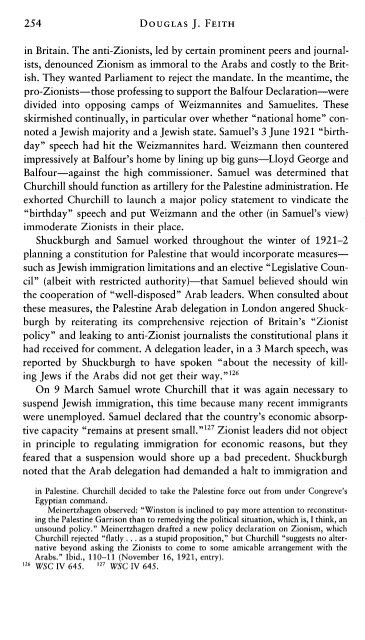Churchill, Palestine and Zionism, 1904-1922 - Douglas J. Feith
Churchill, Palestine and Zionism, 1904-1922 - Douglas J. Feith
Churchill, Palestine and Zionism, 1904-1922 - Douglas J. Feith
You also want an ePaper? Increase the reach of your titles
YUMPU automatically turns print PDFs into web optimized ePapers that Google loves.
254 DOUGLAS J. FEITH<br />
in Britain. The anti-Zionists, led by certain prominent peers <strong>and</strong> journalists,<br />
denounced <strong>Zionism</strong> as immoral to the Arabs <strong>and</strong> costly to the British.<br />
They wanted Parliament to reject the m<strong>and</strong>ate. In the meantime, the<br />
pro-Zionists-those professing to support the Balfour Declaration-were<br />
divided into opposing camps of Weizmannites <strong>and</strong> Samuelites. These<br />
skirmished continually, in particular over whether "national home" connoted<br />
a Jewish majority <strong>and</strong> a Jewish state. Samuel's 3 June 1921 "birthday"<br />
speech had hit the Weizmannites hard. Weizmann then countered<br />
impressively at Balfour's home by lining up big guns-Lloyd George <strong>and</strong><br />
Balfour-against the high commissioner. Samuel was determined that<br />
<strong>Churchill</strong> should function as artillery for the <strong>Palestine</strong> administration. He<br />
exhorted <strong>Churchill</strong> to launch a major policy statement to vindicate the<br />
"birthday" speech <strong>and</strong> put Weizmann <strong>and</strong> the other (in Samuel's view)<br />
immoderate Zionists in their place.<br />
Shuck burgh <strong>and</strong> Samuel worked throughout the winter of 1921-2<br />
planning a constitution for <strong>Palestine</strong> that would incorporate measuressuch<br />
as Jewish immigration limitations <strong>and</strong> an elective "Legislative Council"<br />
(albeit with restricted authority)-that Samuel believed should win<br />
the cooperation of "well-disposed" Arab leaders. When consulted about<br />
these measures, the <strong>Palestine</strong> Arab delegation in London angered Shuckburgh<br />
by reiterating its comprehensive rejection of Britain's "Zionist<br />
policy" <strong>and</strong> leaking to anti-Zionist journalists the constitutional plans it<br />
had received for comment. A delegation leader, in a 3 March speech, was<br />
reported by Shuckburgh to have spoken "about the necessity of killing<br />
Jews if the Arabs did not get their way.,,126<br />
On 9 March Samuel wrote <strong>Churchill</strong> that it was again necessary to<br />
suspend Jewish immigration, this time because many recent immigrants<br />
were unemployed. Samuel declared that the country's economic absorptive<br />
capacity "remains at present sma11.,,127 Zionist leaders did not object<br />
in principle to regulating immigration for economic reasons, but they<br />
feared that a suspension would shore up a bad precedent. Shuckburgh<br />
noted that the Arab delegation had dem<strong>and</strong>ed a halt to immigration <strong>and</strong><br />
in <strong>Palestine</strong>. <strong>Churchill</strong> decided to take the <strong>Palestine</strong> force out from under Congreve's<br />
Egyptian comm<strong>and</strong>.<br />
Meinertzhagen observed: "Winston is inclined to pay more attention to reconstituting<br />
the <strong>Palestine</strong> Garrison than to remedying the political situation, which is, I think, an<br />
unsound policy." Meinertzhagen drafted a new policy declaration on <strong>Zionism</strong>, which<br />
<strong>Churchill</strong> rejected "flatly ... as a stupid proposition," but <strong>Churchill</strong> "suggests no alternative<br />
beyond asking the Zionists to come to some amicable arrangement with the<br />
Arabs." Ibid., 110-11 (November 16, 1921, entry).<br />
126 WSC IV 645. 127 WSC IV 645.


